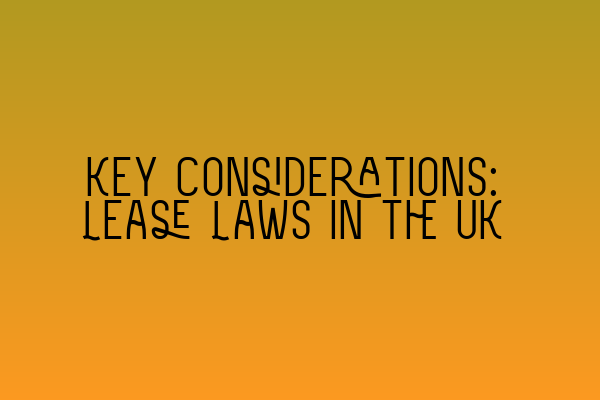**Key Considerations: Lease Laws in the UK**
Lease laws in the UK play a crucial role in the real estate sector, providing a legal framework for the relationship between landlords and tenants. Whether you are a property owner or a tenant, it is essential to understand the key considerations surrounding lease laws to ensure a smooth and fair lease agreement. In this article, we will explore some important factors to keep in mind when dealing with leases in the UK.
**1. Types of Leases**
There are various types of leases that one can enter into in the UK. The most common types include assured shorthold tenancies (ASTs), assured tenancies, and commercial leases. Each type of lease has its own set of rules and regulations, so it is necessary to familiarize yourself with the specific requirements of your lease.
For example, if you are a residential tenant, an AST might be the most common type of lease you encounter. Understanding the rights and obligations outlined in the AST is crucial for both the tenant and the landlord. Moreover, knowing the rules for eviction, deposit protection, and rent increases can help you navigate the complexities of the lease.
**2. Duration of the Lease**
The duration of a lease is an essential consideration. Leases can vary in length, ranging from short-term leases that last a few months to long-term leases that extend for several years. It is crucial to understand the implications of the lease’s duration for both landlords and tenants.
For tenants, the lease duration determines the security and stability of their occupancy. It is important to consider how long you plan to stay in the property and whether the lease duration aligns with your needs. Landlords, on the other hand, should carefully consider the lease duration to ensure they have a steady stream of income. Short-term leases may provide more flexibility, but they also come with the risk of regular tenant turnover.
**3. Rent and Rent Review**
Rent is a fundamental part of any lease agreement. It is the amount the tenant pays to the landlord for the use of the property. Understanding how the rent is calculated and when it may be subject to review is crucial for both parties.
Rent review clauses allow landlords to adjust the rent periodically during the lease term. It is important to carefully review these clauses to ensure they are fair and reasonable. For tenants, rent review clauses may mean an increase in rent, so it is crucial to understand the frequency and basis of rent reviews before entering into a lease agreement.
**4. Repair and Maintenance Obligations**
Both landlords and tenants have repair and maintenance obligations. The lease agreement should clearly outline who is responsible for repairs and maintenance of the property. Typically, landlords are responsible for structural repairs, while tenants are responsible for maintaining the interior and any damage they cause.
Understanding these obligations is essential to avoid disputes and ensure the property is kept in good condition throughout the lease term. It is advisable for both parties to document the condition of the property before the lease begins to avoid any misunderstandings or disputes regarding pre-existing damage.
**5. Break Clauses**
Break clauses provide the flexibility to terminate the lease before its natural expiration. They allow either the landlord or the tenant (or sometimes both) to end the lease early without breaching the terms of the agreement.
For tenants, break clauses can be advantageous, especially if their circumstances change or they need to relocate. Landlords may also appreciate the inclusion of a break clause in case they need to regain possession of the property. However, it is crucial to review the conditions and notice periods specified in the break clause to ensure compliance and avoid any unintended consequences.
**Conclusion**
Lease laws in the UK are intricate and multifaceted, covering various aspects of the landlord-tenant relationship. Understanding the key considerations, such as lease types, duration, rent, repair obligations, and break clauses, is crucial for both landlords and tenants.
To delve deeper into contract law and its impact, you may find the following articles insightful:
– SQE Contract Law: Analyzing Landmark Cases and Influential Judicial Decisions
– Understanding Contractual Capacity: Rights and Limitations
– Interactive SQE Mock Tests for Contract Law: Test Your Knowledge
– Join Our SQE Contract Law Webinars: Expert Insights and Guidance
– SQE Prep: Mastering the Essentials of Contract Law
By having a comprehensive understanding of lease laws, you can ensure a fair and mutually beneficial lease agreement. For personalized legal advice or assistance with lease matters, it is always recommended to consult with a qualified solicitor specializing in property law.
